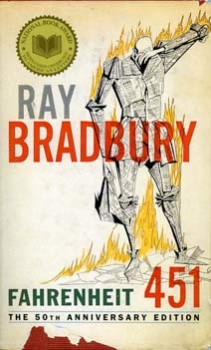This past November, while accepting the National Book Foundation’s Medal for Distinguished Contribution to American Letters at the 65th National Book Awards, Ursala Le Guin had this to say:
“I rejoice in accepting it for, and sharing it with, all the writers who were excluded from literature for so long, my fellow authors of fantasy and science fiction — writers of the imagination, who for the last fifty years watched the beautiful rewards go to the so-called realists.”
The so-called realists have indeed excluded, and oftentimes looked down on, authors of speculative fiction, claiming that genres like sci-fi, fantasy, and horror are shallow in nature, that these genres exist for sheer entertainment and have nothing of substance to offer the public.
They couldn’t be more wrong.
In fact, this view is held more broadly by many people toward the arts in general. Too often, I’ve heard politicians, pundits, and ordinary citizens complaining about the National Endowment for the Arts (NEA) and what a waste it is. As if the arts were insignificant or meaningless, as if works of literature existed for nothing more than leisure.
The Role of Art
Art has an important function in society, one that goes beyond pure entertainment, escapism, or even self-expression. While we could classify some works as strictly for entertainment purposes, there is plenty of art in all disciplines that goes much deeper, from painting and sculpture to music and dance to film and television, and of course, literature.
Great art provokes us to think. It arouses curiosity. It shows us the world from a different perspective. It often imparts truths that we aren’t privy to. And there is a longstanding tradition of art that begs for — or sometimes demands — social change.
The impact of books like To Kill a Mockingbird on our culture cannot and should not be underestimated. Whether it shows us the horrors of war, the effects of oppression, the wrongfulness of injustice, or the dangers of technology, art can serve as a valuable tool for exploring and understanding the world we all live in.
Art is important. But that doesn’t mean all art is important.
It’s true that the speculative-fiction genres are often more entertainment based than, say, literary fiction or historical fiction. Such works are often packed with wow factors: exploding space ships, fire-breathing dragons, and other-worldly creepsters that go bump in the night. I must admit that these genres do often pander to mindless entertainment, especially on the screen.
But the exceptions are notable, and they are many.
Science Fiction’s Role in Our Culture
 Consider Fahrenheit 451. Ray Bradbury wrote the book during the McCarthy era, when people in the United States were being witch-hunted and persecuted for holding unpopular political opinions (unconstitutionally, I might add). The story reminds us that the practice of book burning as a way to suppress dissenting thought has been a gross violation of individual liberty throughout the ages. Fahrenheit 451 was a necessary commentary on censorship of all kinds.
Consider Fahrenheit 451. Ray Bradbury wrote the book during the McCarthy era, when people in the United States were being witch-hunted and persecuted for holding unpopular political opinions (unconstitutionally, I might add). The story reminds us that the practice of book burning as a way to suppress dissenting thought has been a gross violation of individual liberty throughout the ages. Fahrenheit 451 was a necessary commentary on censorship of all kinds.
When news about the NSA collecting our personal digital data broke, I was smack-dab in the middle of George Orwell’s 1984, a book that explored what it would be like to live under a futuristic authoritarian regime that watches over its citizens even in their own homes. The book serves as a critical warning against a government with too much power. On a side note, it also enriched the English language, giving us words and phrases like Big Brother, doublethink, thoughtcrime, and Orwellian.
But let’s go back further and examine the origins of science fiction. Mary Shelley’s Frankenstein has been called the first science fiction novel. This universally known story provides a warning to those who would meddle with nature and create new life forms, which may then wreak havoc and destruction upon humanity. Frankenstein’s monster is the precursor to films and television shows like The Terminator, The Matrix, and Battlestar Galactica, all of which provide futuristic examples of what might befall humanity if we reach the singularity and create artificial intelligences that exceed our own intelligence and could overpower us.
These dystopian examples all present dire warnings for humanity. But let us not forget one of the most beloved science-fiction franchises of all time, which had a more positive message. Star Trek is packed with social, political, and philosophical questions and ideas, but at its heart, it is one man’s vision for the ideal future of humanity. That man is Gene Roddenberry, the creator of Star Trek.
Art, Liberty, and Science Fiction
There’s a reason that the points of fascism often include disdain for and suppression of artistic expression. Free expression is important to individual liberty, of course, but artistic freedom is also a necessary expression of thoughts and ideas, some of which have proven to have tremendous impact on human cultures around the world.
Some art is for entertainment, and that’s fine — desirable even. We all need a little escapism every now and then. But art is at its finest when it provokes us — to think, question, take action, or make change in the world. And science fiction in particular has a longstanding tradition going back to its earliest works of providing intellectual stimulation and forcing us to examine our societies a little more critically or with a lot more awe and wonder.
During her acceptance speech, Ursula Le Guin said something else that deserves consideration. She said, “Books, you know, they’re not just commodities.”
What are your views on science fiction? Are you a fan? Do you prefer stories that entertain you or provoke you? What are some of your favorites?

